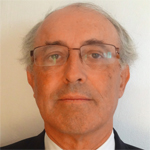Dr. Khanna was part of the steering committee to develop the new ACR/EULAR classification of scleroderma, and was co-principal investigator on the ACR guidelines for the management of gout. He currently leads National Institutes of Health-funded and pharmaceutical trials, and is carving a niche by leading an international effort to develop a response index for clinical trials in scleroderma, “which may facilitate approval of new agents.”
‘No. 1, be adaptable, because rheumatology is going to change a lot.’ —Dr. Khanna
Q: What is it about rheumatology that keeps you so engaged?
A: Scleroderma is an orphan disease affecting between 250,000 and 300,000 people in the U.S. There is no cure, no effective treatments. However, we are making strides in learning about the cause of scleroderma, and developing and testing new effective therapies.
Q: Your award is from your peers; what does that mean to you?
A: It is a great honor to receive this award from my peers. It provides validation of work done over the years during early mornings, late nights, weekends and even during vacation. It provides encouragement and inspiration to me to continue the path that I have chosen.
Q: What advice do you have for your fellow clinical researchers?
A: No. 1, be adaptable, because rheumatology is going to change a lot; No. 2, understand systems biology and big data; and No. 3, if you’re predominantly a clinician or an investigator, get involved in some formal administrative activities, in education, in the business side of medicine—just something different. When things aren’t going well with your major, it’s good to have a minor that is ticking over well.
Q: What has the ACR meant to you?
A: The ACR has been my professional home, the most valuable way for me to network with colleagues and the source of much of my professional development and education. It has been a source of support for our trainees and is, thus, creating our future.
Q: If you could change one thing about the field of rheumatology, what would it be?
A: Provide greater support to our junior investigators to continue the path of research.
ACR Distinguished Basic Investigator Award
 Pierre Miossec, MD, PhD, Professor of Clinical Immunology, University Claude Bernard, Lyon, France
Pierre Miossec, MD, PhD, Professor of Clinical Immunology, University Claude Bernard, Lyon, France
Background: Dr. Miossec describes his career as a “bridge” between medicine and biology, one on which he’s trained and worked with some of the best in the business. His discoveries have affected countless lives, and his mantra has been to always “work on my own patients.”



